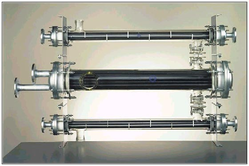Criteria for Selecting a Heat Exchanger for your Process
 From the simplest to the most complex chemical process systems, heat exchangers are needed to carry out the basic but fundamental function of efficiently transferring heat from one medium to another. But how do you figure out which heat exchanger is the right one for you? They are vast in their utilization and are a major component in a seemingly infinite number of systems – from refrigerators to car engines and of course, in our case, chemical plants. Regardless of whichever industrial sector you find yourself in, you are essentially looking for the same end product – that is, a heat exchanger that will efficiently get the job done for you. So the question remains, what standards should you be looking for? This answer will be different on a case by case basis, so we've put together a list of the top principles you'll want to consider that will help you create your short list. The criteria used when selecting a type of heat exchanger include the following:
From the simplest to the most complex chemical process systems, heat exchangers are needed to carry out the basic but fundamental function of efficiently transferring heat from one medium to another. But how do you figure out which heat exchanger is the right one for you? They are vast in their utilization and are a major component in a seemingly infinite number of systems – from refrigerators to car engines and of course, in our case, chemical plants. Regardless of whichever industrial sector you find yourself in, you are essentially looking for the same end product – that is, a heat exchanger that will efficiently get the job done for you. So the question remains, what standards should you be looking for? This answer will be different on a case by case basis, so we've put together a list of the top principles you'll want to consider that will help you create your short list. The criteria used when selecting a type of heat exchanger include the following:
- Application – How does your heat exchanger need to perform to help carry out your process objectives (e.g. condensing, boiling)?
- Operating Specifications – What pressures and temperature ranges will be used during different phases of the process?
- Material of Construction – Do the sudden temperature changes encountered during the process put the unit at risk of suffering thermal stress?
- Characteristics of Thermal Fluid – Is a corrosion resistant material of construction needed due to your heating/cooling medium’s predisposition to fouling?
- Accessibility to Utilities – Will the heat exchanger require a connection to cooling water, steam, hot oil, etc.?
- Space Constraints – Does the system layout and floorplan prohibit the use of certain models of heat exchangers due to limited headroom?
- Housekeeping – Is the heat exchanger design conducive to carrying out the cleaning and maintenance procedures that will need to be performed on a routine basis?
- Scalability – Will the unit be able to carry out the heat transfer needs of the existing system and any future process developments?
- Cost – How much are you willing to spend on a unit based on the range of options available to you? (You must consider purchase cost, installation cost, operating cost, and maintenance cost.)
- Environment – Is the unit energy efficient and what type of carbon footprint does it leave?
By asking yourself the questions listed above, you can take your answers and use them to determine the ideal heat exchanger design based on your operation specifications and other factors identified in your personal criteria. Whether you have a new process or need to replace a heat exchanger that is part of an existing system, it’s important to assess (or reassess) what heat exchanger model is best for your given process. Operating changes due to process developments and heat transfer technology advancements may make a different type of heat exchanger better suited for your process optimization.
De Dietrich Process Systems specializes in shell and tube and glass coil heat exchangers and associated components to optimize your heat transfer requirements. By providing us with the parameters of your process, our customer engineers can pinpoint the appropriate size and type of heat exchanger that is the optimal solution to your process requirements. Our heat exchangers are available as stand-alone equipment or can be incorporated into a system.
